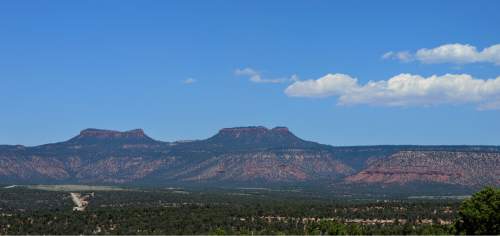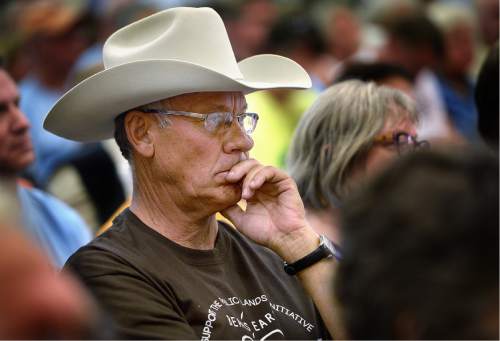This is an archived article that was published on sltrib.com in 2016, and information in the article may be outdated. It is provided only for personal research purposes and may not be reprinted.
Gov. Gary Herbert on Wednesday derided a multitribe proposal for a national monument as "a political tomahawk" that will do more to foment conflict than to protect the Bears Ears region considered sacred by Native Americans.
In his remarks at a Senate field hearing in Blanding, he said these mesas and canyons in San Juan County should be protected, but by congressional action, not through the stroke of a president's pen.
"It is my belief that a unilateral monument designation will divide the people. It will create anger and division. It will provoke protest and may inhibit our ability to resolve tough public land management decisions for decades to come.," Herbert told the Senate Energy and Natural Resources Committee.
Utah's Sen. Mike Lee hosted the hearing at San Juan High School on Wednesday, 11 days after a well-attended listening session hosted by Interior Secretary Sally Jewell, who heard from a variety of voices both pro and con on the proposed 1.90-million-acre national monument. Lee's gathering heard only from those who oppose the monument sought by a coalition of five Indian tribes and the grass-roots tribal group Utah Dine Bikeyah, which are calling on President Barack Obama to use the Antiquities Act to set aside these lands.
Joining Herbert on the witness panel was Utah's Rep. Rob Bishop, who is spearheading public land legislation framed as an alternative to a monument designation; San Juan County Commissioner Bruce Adams; and two local Navajo fighting the monument.
These members of the tribe's Aneth Chapter House repeated allegations that the Bears Ears Inter-Tribal Coalition is using deceit to fool local Native Americans into supporting a monument.
Chester Johnston claimed the coalition's proposal was drafted not by Native Americans, but by rock climbers, environmentalists, archaeologists and other outsiders in an attempt to close off the land.
"This is an insane and senseless act," he said. "The motive for this tip of action is greed, pride and inclining of satisfying specific interested groups. It totally excludes people of San Juan County."
A plain reading of the coalition's 40-page proposal, however, indicates it would preserve access and traditional tribal uses of the land, as well as require co-management structure that would give tribes a say over land use planning.
Retired educator Lewis Singer is not buying it.
"National monument status will restrict access to the land, require payment of entrance fees, and may restrict or prohibit traditional activities such as hunting, gathering wood, picking pine nuts, acquiring medicinal herbs, and performing ceremonies on the land," Singer told Lee. He pointed to the Navajos' negative experience following the designation of the Wupatki and Canyon de Chelly monuments.
"The Navajo people have given up enough of their tribal lands for national monuments," he said. "How can we as a native people trust the United States Government when they provide reservations and then come back and claim them as national monuments?"
Lee said he had invited federal officials and monument proponents to testify, but they declined to come. Among those invited was Utah Dine Bikeyah board member Mark Maryboy, who rejected the offer, citing the proceeding's "one-sided nature" and a pattern of spurious allegations and racist remarks hurled at tribal proponents of a Bears Ears monument.
"These meetings have repeatedly proven uncomfortable for Native leaders to attend because of the levels of disrespect and disregard for traditional viewpoints by non-Native county residents," wrote Maryboy, a longtime Navajo activist and politician, in a July 23 letter to Lee.
He cited the booing and insults, sometimes coming from fellow Navajo, directed at Navajo Nation President Russell Begaye as he spoke in favor of a monument at the July 16 hearing in Bluff. Maryboy was particularly offended by Adams' remark at the earlier hearing that his Mormon ancestors were the first people to "settle" San Juan County.
At Wednesday's event, Adams recalled the Hole in the Rock pioneers' intention of helping Native Americans "with the domestic needs that they had" and the friendships forged between the two groups after a period of hostility. The rancher said he feared a monument would lead to severe cuts in grazing on Cedar Mesa. He claimed grazing has been reduced by 60 percent in the 20 years since former President Bill Clinton's designation of the Grand Staircase-Escalante National Monument, still a source of bitter resentment in Garfield and Kane counties.
Representatives from the U.S. Department of the Interior did not testify only because no "official" invitation came to the agency from committee chairwoman Lisa Murkowski, according to spokeswoman Jessica Kershaw.
The department did submit a formal statement that emphasized the conservation successes historically accomplished under the Antiquities Act, which President Theodore Roosevelt signed in 1906, and said Obama intends to continue deploying his authority to protect the nation's special places, including archaeological sites at risk of looting.
Roosevelt used the law 18 times to set aside monuments that gave birth to Grand Canyon, Petrified Forest and Olympic national parks, as well as Chaco Culture National Historical Park. Since then, 16 presidents have invoked the law to establish or expand 150 national monuments.
"These monuments have become universally revered symbols of America's beauty and legacy," the statement reads. "These sites are cherished landscapes that help to define the American spirit. They speak eloquently to the wisdom of retaining the Antiquities Act in its current form."
Bishop, however, sees wisdom only in restricting the act's scope, which he alleges has been abused for political purposes. Last year, he jokingly told an audience that those who support the Antiquities Act need to die, suggesting such deaths would cull stupidity from the gene pool.
He warned that the monument proponents' vision for access and co-management cannot be assured under an Antiquities Act designation, while it could be if his Public Lands Initiative passes Congress before Obama acts.
"What the [Obama] administration has promised cannot legally be accomplished. They cannot deliver, but congressionally in statute we can deliver," Bishop said. "A presidential proclamation cannot guarantee squat."
Brian Maffly covers public lands for The Salt Lake Tribune. Maffly can be reached at bmaffly@sltrib.com or 801-257-8713.
Twitter: @brianmaffly





